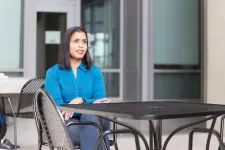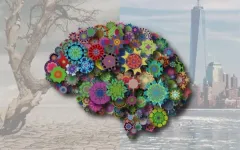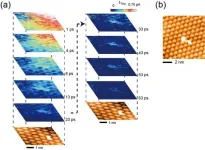To deal with the stress the situation created, Rangamani turned to a support network of fellow female faculty members around the United States. They chatted and texted and eventually decided to write a scholarly article with recommendations for all other female principal investigators in academia.
The article, "Ten simple rules for women principal investigators during a pandemic," was published October 2020 in PLOS Computational Biology. It's perhaps important to note that despite its title, the article is careful to say that the cardinal rule is that there are no rules. So all 10 points outlined are in fact suggestions. Also despite its title, Rangamani says most of the 10 points outlined in the publication can apply to all caregivers juggling work and caregiving during the pandemic.
"Without in-person school or daycare, and without after-school programs, there is really no way for caregivers to function at full capacity at work," Rangamani said.
In addition, such concerns have not been discussed openly in the workplace, the authors felt. Their real fear is then that talent nurtured through the years will be lost in one fell swoop--and their main goal is to try and change this. Rangamani and fellow co-authors want to normalize conversations about juggling work and family obligations. "If you want to say 'I can't meet at this time, because I need to be on a Zoom with my kids, that doesn't mean you're not serious about your job or not doing your job well," she said. "We want to reduce this perception bias."
This is particularly important to maintain equity and diversity within an organization, Rangamani added. "We need to be extremely vigilant to ensure that those who are particularly vulnerable do not exit the system," she said. Single parents, those who are taking care of elderly parents and relatives, and parents whose children have special services are especially at risk, she added. "The intense pressure of being 'on' all the time is simply not realizable right now."
While the paper outlines some changes that can be made at a campus-wide or even university system level, Rangamani is focused on a smaller scale: an office or a department for example. It is much easier to get these smaller groups together and have genuine conversations about what the individual needs are and what can be done to get our colleagues through this intensely difficult period without sacrificing quality or fairness.. "There are measures you can take at the grassroots level," she said.
In order to normalize these conversations about work-life balance Rangamani hopes that leadership will empower those who hesitate to ask for help to do so. Here are the 10 suggestions that the paper outlines to cope during the pandemic: Find a peer group of women to provide professional support.
"The authors are all members of an online group for women PIs in biomedical engineering, which has historically served as a sounding board for professional concerns. We have found that maintaining these connections has been essential over the course of our careers and are even more important during this quarantine period." Say no to requests to do anything outside of your main responsibilities
"If you can't do them now, you can offer a time when you might be able to do them; the requesting party will need to recognize that your future schedule could go through upheaval as surges of the disease hit different areas and restrictions change. " Drop something
"True, your house might not be as clean as you would like, and you may be eating more frozen pizza than you normally would tolerate. Remember that you are not the only person accepting this as your "new normal." We can't forget that the goal during a pandemic is survival--if you are keeping yourself physically and mentally healthy, you are more than succeeding." When you have energy to do more than the minimum, use it to support women and underrepresented groups
"We recognize that advocacy of this nature is a privilege, and not everyone is able to do so safely. If you are in the position to support women and underrepresented groups and have the energy, pick a cause and lean into it. Also, recognize that this action can take many forms, some of which may be a better fit for your individual situation." Remember, you know yourself best
"You know the things that have historically helped you relieve stress. Make a list of 10 of them. Some of them may not be an option during quarantine (oh, how some of us miss writing in coffee shops). But for those that are an option, try to do 1 of them every now and then." It's OK to push back
"Perpetuating the myth that we can all work to the same degree (or better!) than we did a few months ago is very damaging to many women PIs. When you hear statements such as "everyone is writing more grants now" and "since we have more time, let's have a virtual conference about this topic," it's more than OK to push back that this is not your reality, regardless of the reason." Remember, you have some flexibility to make your own schedule
"If there are pockets of time where you find yourself able to focus better than others, do your best to protect them. Block these times on your calendar--both in the near future and in the upcoming months by declining invitations for extraneous responsibilities." Whatever help you can get, take it
"Perhaps your kids are old enough that they can even help with some of your work--1 of the authors tried (unsuccessfully) to engage her son in doing analysis on ImageJ (NIH, Bethesda, Maryland). Another purchased a 3D printer and recruited her daughter to help print parts for an OpenSPIM setup." Do your best to remember that others are struggling too--be empathetic and work to build a community
"We suggest that each situation is approached with empathy, while maintaining your standards and accountability. For example, empathy may mean that when you assign a task to a group member or staff, you ask them whether the timeline is feasible. If it's not, that may be a sign that in the future you should aim to give them more advance notice. If a pattern of not completing work continues, it is then time to ask for an explanation. Recognize that just as no one is fully aware of your situation, you are not completely aware of your colleague's situation." Don't lose your sense of humor
"We know, there is nothing funny about this situation. Many of us have needed or will need space to grieve deeply. However, our experience is that where you can share a laugh, you should."
Rangamani herself does her best to implement some of these suggestions. She prioritizes the well-being of her own research group over other zoom meetings; protects her research time; and does not schedule meetings at lunch time, if she can help it.
"While there is a light at the end of the tunnel in the form of vaccines," Rangamani also notes, "this global health crisis may be a once-in-a-lifetime opportunity for the academy to take a close look at how we can empower our vulnerable colleagues and make policy changes to change our culture for the better."
The authors put rule, or rather suggestion, 10 in practice, by including a list of humorous rules and tips in a supplemental file.
"Service expectations are now completely fulfilled by raising scientifically literate humans of our own and science communication by way of family conversations, Facebook and Twitter debates," they write.
INFORMATION:



